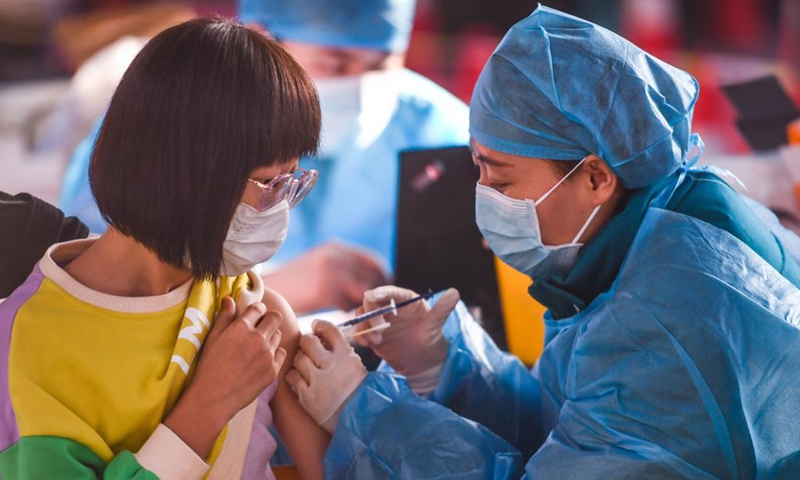
A kid receives a dose of COVID-19 vaccine at a school in Hohhot, North China's Inner Mongolia Autonomous Region, November 23, 2021. Photo: Xinhua
Omicron is like a combination of the Beta and Delta variants but existing vaccines are still efficient against it despite declining efficacy, Gao Fu, Director of the Chinese Center for Disease Control and Prevention, told media on Wednesday.
Omicron has the strong immune escape ability of the Beta variant and the strong transmissibility of the Delta variant, Gao said, according to a report by China News Week released on Wednesday.
"It will take at least two weeks to find out how dangerous the variant is or if it will replace Delta to become the most dominant variant. But in terms of virology, the pathogenicity of virus would weaken as it tries to survive," Gao noted.
Possibility cannot be ruled out that more mutations would occur, but no matter how the virus mutates, it is still the SARS-CoV-2 against which existing vaccines would still be effective, according to Gao.
Especially taking into account that vaccines have played a vital role in preventing severe cases, deaths and hospitalizations, Gao noted.
Based on the current situation of the pandemic, Gao predicted that China would carry on its dynamic zero-COVID policy until the end of spring, 2022, as during this period there will certainly be imported cases that could generate local community transmission.
As to when the COVID-19 pandemic would end, Gao said that nobody would dare to predict it but the global vaccination rate would be a major element to have into consideration.
The dynamic zero-COVID policy buys China time in research and development as well as marketing of COVID vaccines and drugs. It also allows the Chinese population to be mentally prepared if the virus persists after vaccination, Gao said.
Gao also revealed that Chinese authorities and experts are discussing the use of different vaccines as booster shots as previous studies show that this method would provide better protection. "As long as there are vaccines, [we] do not refuse or reject the public to accept different shots," said Gao.
China has administered nearly 2.6 billion shots as of Tuesday. At least 1.1 billion Chinese people had been fully vaccinated as of November 29. Media reports citing various experts said that the country is expected to vaccinate at least 80 percent of its population by the end of the year.
Gao noted that with the SARS-CoV-2 it is required a vaccination rate of at least 85 percent to build herd immunity, not to mention that there are breakthrough infections.
"What is more important is that it does not depend on how many people in China get vaccinated, but how many people globally get vaccinated, to build real herd immunity which is global rather than in a specific country," Gao noted.
